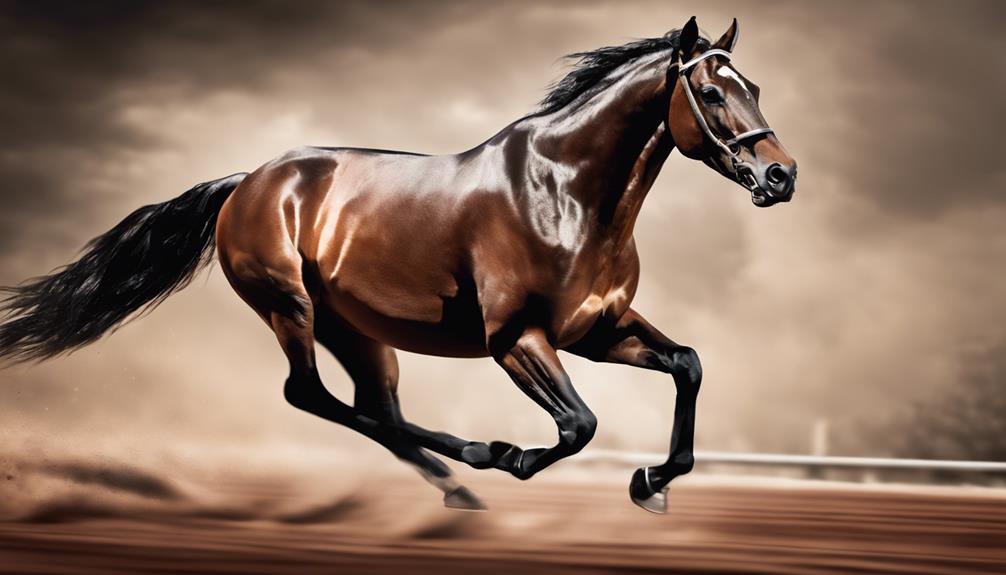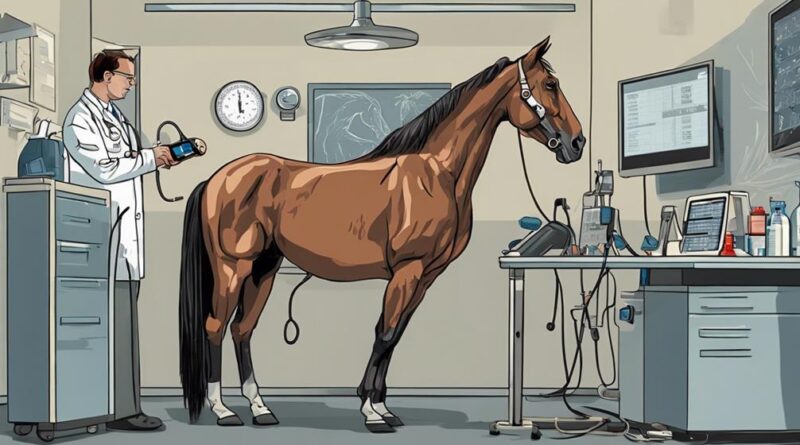Why Is Regular Health Check Vital for Racing Horses?
Imagine a racing car zooming down the track, its engine purring smoothly. Now, picture that same car with a slight hitch in its gait, a subtle sputter in its engine.
Just like a finely-tuned machine, racing horses require regular health check-ups to ensure they perform at their best. But why is this maintenance so crucial?
Let's explore the intricate web of factors that can influence a racing horse's performance and ultimately determine their success on the track.
Importance of Regular Health Checks
Regular health checks are crucial for maintaining the peak performance and well-being of racing horses. By implementing preventive measures through regular health check-ups, you can ensure that your horse is in top condition for races. These check-ups are essential for performance optimization as they help identify any potential issues early on, allowing for prompt treatment and management.
During health checks, veterinarians can conduct thorough physical examinations to assess your horse's overall health. They may also perform specific tests to check for any underlying health conditions that could affect your horse's performance. By staying proactive with these preventive measures, you can address any concerns before they escalate, ultimately enhancing your horse's racing capabilities.
In addition to physical health, regular health checks also encompass dental care, hoof maintenance, and nutrition evaluation. These aspects play a significant role in the well-being and performance of racing horses. Through consistent monitoring and adjustments, you can ensure that your horse is receiving the necessary care to stay at the top of its game.
Common Health Risks in Racing
To ensure the peak performance of your racing horse, it's essential to be aware of the common health risks they face in the competitive environment. Racing horses are prone to various health issues that can impact their performance and overall well-being. One significant risk is injuries, which can occur due to the intense physical demands of racing. Implementing injury prevention measures, such as proper warm-ups, cooldowns, and regular veterinary assessments, is crucial for maintaining your horse's health and longevity on the track.
In addition to injury prevention, focusing on performance enhancement is vital for racing horses. Training strategies play a key role in optimizing your horse's abilities and ensuring they're in top form for races. Tailoring training programs to suit your horse's individual needs and capabilities can help prevent burnout and improve their overall performance. Moreover, incorporating recovery techniques like post-exercise massages, hydrotherapy, and adequate rest periods can aid in muscle repair and reduce the risk of fatigue-related injuries.
Being proactive in addressing common health risks in racing is paramount for the success of your horse. By prioritizing injury prevention, performance enhancement, and utilizing effective training strategies and recovery techniques, you can help your racing horse stay healthy, happy, and competitive in the demanding world of horse racing.
Benefits of Preventative Care
What advantages does proactive care offer to ensure the health and longevity of your racing horse? Implementing preventive measures through regular health checks can significantly impact your horse's well-being. Here are some key benefits:
- Early Detection: Regular check-ups allow veterinarians to catch any potential health issues in their initial stages, increasing the chances of successful treatment and recovery.
- Preventive Measures: By proactively monitoring your horse's health, you can take preventive actions such as vaccinations, deworming, and dietary adjustments to keep them in top condition.
- Improved Performance: Maintaining your horse's health through preventative care can enhance their athletic performance, allowing them to perform at their best during races.
- Cost-Effective: Investing in regular health checks and preventive care can help you save money in the long run by avoiding expensive treatments for advanced illnesses.
- Longevity: By prioritizing your horse's health with proactive care, you contribute to their overall longevity and quality of life, ensuring they can enjoy a successful racing career for years to come.
Key Components of Health Check
Implementing regular health checks for your racing horse involves assessing specific key components that are crucial for maintaining their optimal well-being and performance. Routine assessments play a vital role in ensuring that your horse is in top condition for racing. These evaluations typically include monitoring your horse's vital signs such as heart rate, respiratory rate, temperature, and overall demeanor. By regularly checking these parameters, you can detect any abnormalities early on and take necessary actions to address them promptly.
Physical examinations are another essential component of a thorough health check for your racing horse. These examinations involve assessing your horse's body condition, muscle tone, joint flexibility, and overall physical fitness. Through physical examinations, you can identify any signs of injury, strain, or other physical issues that may impact your horse's performance. Additionally, dental health is often evaluated during these exams as proper dental care is crucial for your horse's overall well-being and ability to eat comfortably.
Incorporating routine assessments and physical examinations into your horse's healthcare regimen can significantly contribute to their longevity and success in racing. By staying proactive and attentive to your horse's health, you aren't only ensuring their well-being but also maximizing their potential in the competitive racing environment.
Monitoring Nutritional Needs
Regularly monitoring the nutritional needs of your racing horse is essential for optimizing their performance and overall well-being. Ensuring they receive the right balance of nutrients can make a significant difference in their energy levels, muscle development, and overall health.
To effectively monitor your horse's nutritional needs, consider the following:
- Consult with a Professional: Seeking advice from a qualified equine nutritionist can help you develop a tailored diet plan that meets your horse's specific requirements.
- Regularly Assess Body Condition: Monitoring your horse's body condition score can indicate whether they're receiving the right amount of nutrients or if adjustments are needed.
- Provide Quality Forage: High-quality forage is the foundation of a horse's diet and plays a crucial role in maintaining their nutritional balance.
- Consider Dietary Supplements: In some cases, dietary supplements may be necessary to ensure your horse is getting all the essential vitamins and minerals they need.
- Monitor Performance and Behavior: Changes in your horse's performance or behavior could indicate that their nutritional needs aren't being met, prompting the need for adjustments in their diet.
Recognizing Early Warning Signs
Monitoring your racing horse's behavior for early warning signs is crucial for maintaining their health and performance. Early detection of any issues can prevent more serious complications down the road. Being aware of common symptoms and changes in your horse's usual demeanor is key to catching potential problems early.
Symptom awareness is essential when observing your racing horse. Look out for signs such as changes in appetite, weight loss, abnormal sweating, lethargy, lameness, unusual aggression, or a drop in performance. Any of these could indicate an underlying health issue that needs attention. By recognizing these early warning signs, you can address concerns promptly and prevent them from escalating.
Regularly checking your horse's vital signs can also aid in early detection. Monitoring their temperature, pulse, and respiratory rate can help you spot abnormalities before they become serious. Keeping track of these vital signs during exercise and rest periods can provide valuable information about your horse's health status.
Impact of Regular Exercise

Regular exercise plays a crucial role in enhancing the performance and overall well-being of your racing horse. When you ensure your horse maintains a consistent training regimen, you set the stage for optimal conditioning. Here's how regular exercise impacts your racing horse:
- Improved Muscle Strength: Through regular exercise, your horse develops stronger muscles, leading to better performance on the track.
- Enhanced Cardiovascular Health: Exercise benefits your horse's cardiovascular system, increasing endurance and stamina during races.
- Better Joint Flexibility: Engaging in regular exercise helps maintain joint flexibility, reducing the risk of injuries during intense training sessions.
- Mental Well-being: Exercise not only strengthens the body but also contributes to your horse's mental health, keeping them focused and responsive.
- Weight Management: A consistent exercise routine aids in managing your horse's weight, ensuring they're in prime physical condition for racing.
Tailoring Care for Peak Performance
To optimize peak performance in your racing horse, tailoring specific care practices is essential to meet their individual needs and maximize their potential on the track. Customized training programs play a crucial role in ensuring that your horse is in top condition for racing. By tailoring the training regimen to address your horse's strengths and weaknesses, you can enhance their performance and overall well-being.
Performance optimization also involves personalized nutrition plans. Just like athletes, racing horses require a specialized diet to support their intense physical activity. Working with a veterinarian or equine nutritionist to develop a nutrition plan that meets your horse's unique requirements can make a significant difference in their performance on the track.
In addition to training and nutrition, regular monitoring and adjustments are key to tailoring care for peak performance. Observing your horse's response to training, making necessary changes to their routine, and addressing any health issues promptly are all vital aspects of optimizing their performance.
Frequently Asked Questions
Are There Any Specific Health Checks That Are Unique to Racing Horses Compared to Other Types of Horses?
When it comes to racing horses, there are specific health checks unique to them. These include focusing on hoof care and digestive health to ensure optimal performance. Additionally, monitoring the respiratory system and musculoskeletal health is crucial for racing horses to prevent injuries and maintain peak fitness levels.
Regular health check-ups are essential for addressing these specific needs and keeping your racing horse in top condition for competition.
How Often Should Racing Horses Typically Undergo a Health Check?
For racing horses, regular health check-ups play a crucial role in maintaining their performance and longevity. The frequency of check-ups is typically determined by your veterinarian based on your horse's individual needs. Early detection of any health issues through these check-ups can prevent more serious problems and ensure your horse stays in top shape for racing.
Can Regular Health Checks Help Prevent Injuries During Races?
Regular health checks for racing horses are crucial for preventive care and injury prevention. By monitoring their health consistently, you can detect any potential issues early on, allowing for timely intervention and treatment. This proactive approach helps minimize the risk of injuries during races, ensuring that your horses remain in top condition and perform at their best.
Prioritizing regular health checks is a key aspect of maintaining the well-being and performance of your racing horses.
Are There Any Specific Nutritional Needs That Racing Horses Have That Need to Be Monitored Closely?
To keep your racing horse in top shape, it's crucial to monitor their nutritional requirements closely. Certain dietary supplements might be needed to support their performance and overall health. By staying on top of these needs, you can help ensure that your horse has the energy and stamina required for races.
Be sure to consult with a veterinarian or equine nutritionist to create a tailored nutrition plan that meets your horse's specific demands.
How Do Health Checks for Racing Horses Differ Between Training Season and Racing Season?
During the training season, health checks for racing horses focus on assessing their overall well-being, monitoring any injuries or strains, and adjusting their training regimen accordingly.
In contrast, in the racing season, the emphasis shifts to evaluating performance indicators, managing recovery time, and making necessary dietary changes to support peak performance.
Regular health checks ensure that racing horses are in optimal condition to excel in both training and competitions.
Conclusion
In conclusion, regular health checks are vital for racing horses to ensure they're in peak condition for optimal performance. By monitoring their health, nutritional needs, and exercise routine, you can prevent common health risks and recognize early warning signs.
Taking proactive measures through preventative care will ultimately lead to a longer and successful racing career for your horses. Make sure to prioritize their health to keep them in top shape for the track.
